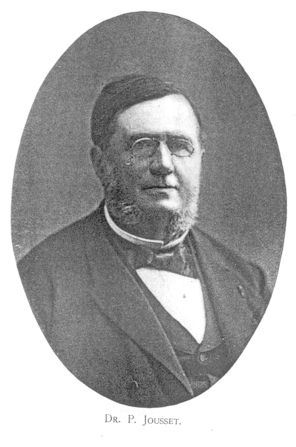 Pierre Jousset M.D. (3 December 1818 – 22 December 1910) was a French orthodox physician who converted to homeopathy, to become one of the founders and President of La Société Française d’Homéopathie in 1889, founder, Medical Director and Physician at the Hospital St. Jacques in Paris, Editor of L’Art Médical journal with Jean Paul Tessier, and President of the 1889 International Homeopathic Congress held in Paris.
Pierre Jousset M.D. (3 December 1818 – 22 December 1910) was a French orthodox physician who converted to homeopathy, to become one of the founders and President of La Société Française d’Homéopathie in 1889, founder, Medical Director and Physician at the Hospital St. Jacques in Paris, Editor of L’Art Médical journal with Jean Paul Tessier, and President of the 1889 International Homeopathic Congress held in Paris.
Pierre Jousset was the homeopathic practitioner of influential French theologian Jean Baptiste Henri Lacordaire, and he was a student of Jean Paul Tessier.
Pierre Jousset was a colleague of Bazin, Francois Cartier, Victor Chancerel, Chanet, Cramoisy, Alphonse Crétin, Paul Francois Curie, Antoine Hippolyte Desterne, John James Drysdale, Gerard Anaclet Vincent Encausse, Fredault, Gaillard, Jean Pierre Gallavardin, Gounard, Love, Reuben Ludlam, Louis Molin, Antoine Nebel, Charles Ozanam, Daniel Parenteau, Francois Perrussel, Perry, Léon Francois Adolphe Simon, and many others.
Jousset was born at Nantes, Brittany, in December 1818. In 1838 he began his medical studies in Paris under the newly appointed clinical chair Jean Paul Tessier. Jousset showed remarkable aptitude as a clinician and, alongside Tessier, was part of a small community of Parisian physicians at the cutting edge of therapeutics that included Jules Davasse, Alphonse Milcent, Antoine Imbert-Gourbeyre, Louis Georges Joseph Frédéric Gabalda, Jules Helot, and later Charles Ozanam, and Félix Frédault.
Following Tessier’s conversion to homeopathy in 1849, Jousset was denied a professorship, presumably because of the medical heresy of his mentor. Jousset left Paris in disgust and set up practice in a small town in Poitou for the next few years.
In 1854 Tessier established the preeminent French professional homeopathic journal, L’Art Médical. Jousset returned to Paris to help edit the journal, becoming its main contributor and, nineteen years later, its editor-in-chief.
Jousset was an active researcher and conducted clinical trials with tuberculinum aviare,
In another article, [Jousset] collaborated with G. Proust (L’Art Médical, Nov. 1907), Jousset’s opinion, from an experience with more than forty phthisical patients, was that the bouillon of Denys, with a careful technique, is entirely inoffensive, and that its beneficial influence is shown by the constitutional condition, the febrile movement, and even by the condition of the pulmonary lesion.
Jousset remarks that, in this treatment, the cure is assured when the injections of pure filtered bouillon do not produce an increase in temperature. In such case, and then only, we must discontinue the treatment.
Jousset also conducted clinical trials with pancreatic juice:
Long before the discovery of Insulin Pierre Jousset of Paris prepared a pancreatic juice on a glycerine basis which he administered to diabetic patients in doses of 10 or 20 drops a day in water and had results sufficiently good to consider pancreatic juice, orally administered, as a remedy of great value in diabetes.
Jousset was one of a number of distinguished French homeopaths, including Francois Perrussel, Jean Pierre Gallavardin, Léon Francois Adolphe Simon, Alphonse Noack, and Pierre Augustus Rapou who founded homeopathic dynasties.
Jousset was also a devout Catholic. In 1889 Jousset protested at what he saw as the new religion of evolutionary naturalism:
“Anti Christian science has perhaps never been more dangerous than at this moment. Rich in positive knowledge, it has become proud and authoritarian. The intolerance it blames on the Catholic Church has become its supreme law. It imposes its theories as dogmas, its hypotheses as incontestable truths; the dreams of imagination become articles of faith – science is infallible!“
In addition to his clinical work and his research as a prover of homeopathic remedies, Jousset was a prolific writer. In addition to his published books he also submitted cases and articles to various homeopathic publications.
Obituaries for Jousset were found in The Critique, the Transactions of the … Session of the American Institute of Homœopathy, the Bulletin Général de Thérapeutique Médicale, Le Propagateur de l’Homoeopathie.
Select Publications:
- De l’expectation et du traitement homéopathique dans la pneumonie (1863)
- Eléments de médecine pratique (1868)
- Histologic genérale: étude critique sur Virchow et La pathologic cellulaire (1870)
- Traité élémentaire de matière médicale expérimentale et de thérapeutique (1884)
- Leçons de clinique médicale professées à l’Hôpital homoeopathique Saint-Jacques 1875-1876-1877 (1886)
- Practice of medicine: containing the homeopathic treatment of diseases (1901)
- Constitution de la thérapeutique (1902)
- The pathogenic microbes (1903)
- Prophylaxie de la tuberculose (1907)
- Mémorial de thérapeutique homoeopathique (1920)
Of interest:
Abbe Fernand Jousset was a Professor of Geography and History at Nantes
Henri Jousset, son of Pierre Jousset, was also a homeopath, Physician at the Hospital St. Jacques,
Henri Jousset wrote Brutes et birbes, Étude expérimentale et clinique de l’action du calomel sur le foie et les reins, Le signe de Robert Wreden, La Fille des carriers, and he also submitted cases and articles to various homeopathic publications,
Marc Jousset, son of Pierre jousset was also a homeopath, and a Physician at the Hospital de Paris, the Hospital de l’enfant Jesus, and the hospital St. Jaques, and he was a member of the La Societe Francaise de Homeopathie,and and Secretary of the Homeopathic Congress.
Marc Jousset also practiced at Boulevard St. Germain 241, Paris.
Marc Jousset submitted cases and articles to various homeopathic publications, and he also wrote Les maladies de l’enfance: description et traitement homeopathique (1888), Homeopathy and Official Medicine, Essai sur les hématocèles utérines intrapéritonéales (1883), Mémorial de Thérapeutique Homoeopathique (2nd. ed., 1920).


Leave A Comment